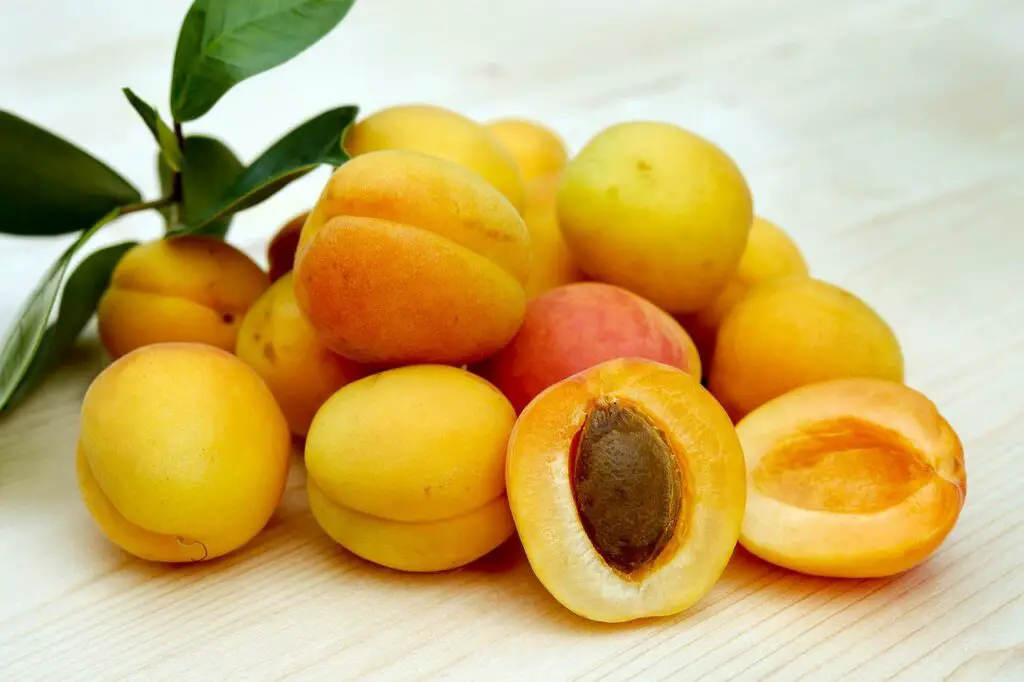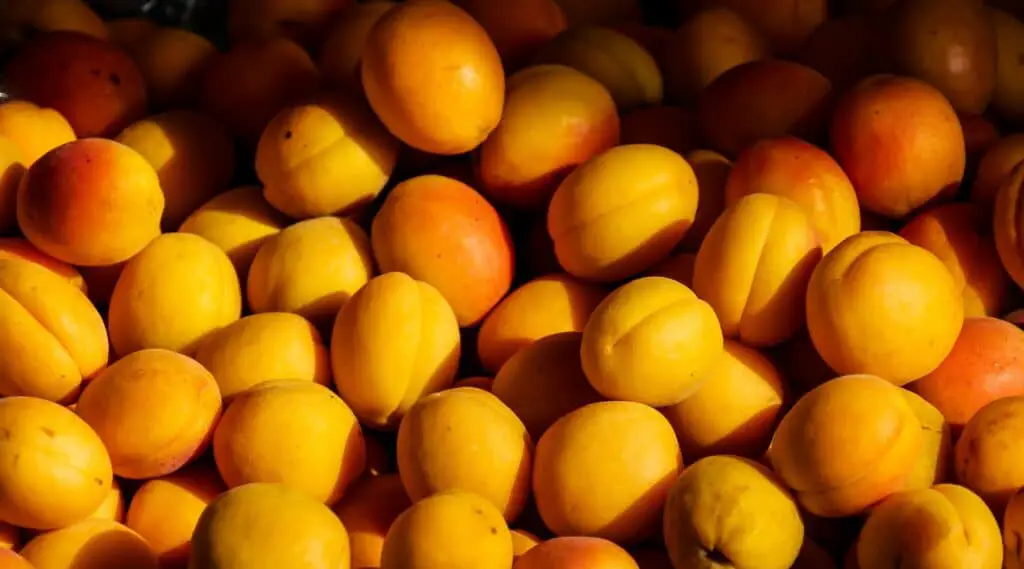Picture this; it’s a hot summer day and you’re out in the yard playing fetch with your furry best friend.
You throw the ball and they sprint after it with pure joy.
As they run back to you, tongue lolling out of their mouth, you notice something strange – there’s an apricot pit stuck in their teeth.
You then panic because you have heard that apricots are dangerous for dogs, but is this true?
Let’s take a look at what you need to know before feeding your dog an apricot.
The flesh of an apricot is safe for dogs to eat, but the pit can be dangerous.
The pit contains a small amount of cyanide, which is poisonous to dogs (and humans).
If your dog swallows the pit, they could experience difficulty breathing, an increased heart rate, and gastrointestinal upset.
This article seeks to answer all the questions you may have about feeding apricots to dogs.
Read on to find out the health benefits your dog can reap from the fruit and how much you should feed it.

What are the health benefits of apricots to dogs?
An apricot flesh is a good source of vitamins A and C, potassium, and fiber.
It can be a healthy treat for your dog in moderation.
We take a look at some notable benefits:
Nutrition
Apricots are nutrient-dense, owing to the high amounts of minerals and vitamins.
These nutrients benefit dogs in various ways.
They include calcium, potassium, antioxidants, fiber, Vitamins A and C, iron, and copper.
All these nutrients work together to ensure your dog’s organs remain healthy and functional.
Smooth digestion
Apricot is a rich source of dietary fiber, a nutrient that helps your dog curb constipation by softening its stool to make it easy to pass.
It also helps dogs deal with digestive issues such as diarrhea by helping solidify their stools.
Improves immunity
Apricots boost your dog’s immunity.
They contain antioxidants which equip dogs with the ability to fight harmful bacteria, toxins, and viruses that can cause diseases.
If your dog has underlying health conditions, improved immunity reduces the severity of these diseases, thus making the healing process fast and effective.
Strengthening bones and muscles
The calcium and potassium in apricots improve the health of your dog’s bones and muscles.
This helps to prevent the intensity of injuries, pain, and cramps.

How are apricots risky for dog consumption?
Although it’s evident that apricots offer several health benefits to dogs, they can present health risks in the following ways:
Choking
If your dog accidentally ingests the pit, stem or leaves of apricots, it can choke.
Since your dog’s organs are too small and sensitive, these parts can stick in its passage or throat, causing potentially fatal choking.
Blockage
When your dog consumes can experience blockage in the intestines or stomach due to consuming the outs or stems of apricots.
Its organs aren’t able to digest these parts and are unable to excrete them.
Digestive problems
Excessive consumption of apricots causes digestive issues in dogs because of too much fiber intake.
This can lead to nausea, diarrhea, vomiting, drowsiness, lethargy, and stomach discomfort.
Weight gain
Apricots contain too much sugar and calories which can lead to unhealthy weight gain in your dog, especially if it consumes them in large amounts.
Cyanide poisoning
Consuming the stems, pits, or leaves of apricots can expose your dog to cyanide poisoning because they contain the toxin amygdalin.
This poisoning prevents oxygen from passing into your dog’s body, which can be fatal.

What should you do when your dog consumes excess apricots?
When your dog eats huge amounts of apricots, it will exhibit symptoms such as vomiting, diarrhea, lethargy, and drowsiness.
If you notice any of these symptoms or unusual behavior in your dog, seek immediate help from a veterinarian.
Continuous vomiting and diarrhea may expose your dog to dehydration which can be fatal.
It’s advisable to feed your dog plenty of water if you notice symptoms like vomiting and diarrhea to prevent the severity of dehydration.
You should avoid inducing vomiting to get the apricots out because you can expose your dog to aspiration pneumonia.
How do you safely feed your dog apricots?
To safely feed your dog apricots, stick by the following precautions:
Consult a veterinarian
Seek the guidance of your vet before adding apricots to your dog’s diet, especially if it’s its first time.
Check the ingredients
If you’re feeding your dog dried apricots, check the label for added sugars.
Some apricot products, such as apricot jam, contain artificial sweeteners like xylitol that are toxic to dogs.
Keep the leaves, stems and pits away
Remove and discard these parts before feeding your dog apricots.
They contain traces of cyanide which is poisonous and can be fatal to dogs.
These parts can also choke your dog, and it’s best to keep them far from its reach.
Cut them into small slices
Before feeding your dog apricots, slice them into chewable pieces.
This makes swallowing and digestion easy.
Feed your small dog pieces of about ⅛ of an inch and bigger dogs ¼ inch slices.
Serve in moderate amounts
Apricots should be an occasional treat for your dog and shouldn’t take the place of their main diet.
This fruit should take about 10% of your dog’s daily calorie requirement.
A small dog should eat no more than ½ of the fruit daily, while a bigger breed can have a full apricot.
Are dogs allergic to apricots?
Some dogs are allergic to apricots.
You’ll notice immediate allergic reactions such as sneezing, itching, and coughing after feeding them the fruit.
Do apricots kill dogs?
The flesh and fruity parts of apricots do not kill dogs.
However, if your dog consumes the pit, stems, or leaves of apricots without immediate medical treatment, it can die from cyanide poisoning.
Conclusion
Dogs can eat apricots, but not all parts of the fruit.
The flesh, fruity part is safe for dog consumption.
It contains essential vitamins and minerals that ensure your dog remains healthy and its organs remain functional.
When serving the fruit to your furry friend, serve in portions recommended for its size because excessive consumption is harmful to its health.
Avoid feeding your dog the pit, leaves or stems of apricots as they can cause poisoning.
If your dog ingests these parts of apricots, seek immediate medical treatment
- What Dog Breeds Have Pink Skin? - March 24, 2023
- What Are the Most Inspiring Dog Breeding Quotes? - March 20, 2023
- Can Pheromone Spray Help Improve Dog Breeding Results? - March 19, 2023








